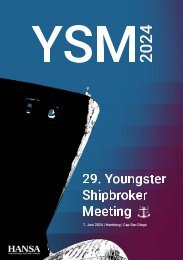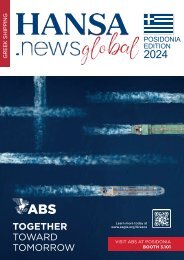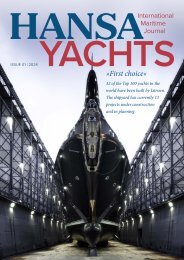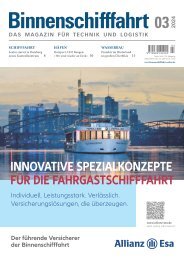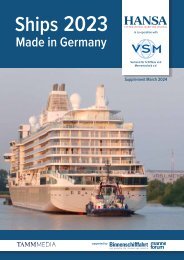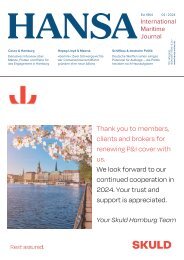HANSA 03-2018
Propeller Performance | Koalitionsvertrag | Jubiläum ZVDS | Robotik im Hafen | Ballastwasser Survey 2018 | Finanz- und Schifffahrtsstandort Nordamerika | Zeaborn & Rickmers
Propeller Performance | Koalitionsvertrag | Jubiläum ZVDS | Robotik im Hafen | Ballastwasser Survey 2018 | Finanz- und Schifffahrtsstandort Nordamerika | Zeaborn & Rickmers
Sie wollen auch ein ePaper? Erhöhen Sie die Reichweite Ihrer Titel.
YUMPU macht aus Druck-PDFs automatisch weboptimierte ePaper, die Google liebt.
Finanzierung | Financing<br />
Photo: Signature<br />
Financial LLC<br />
Photo: Marine Money/<br />
John Galayda<br />
Robert Campbell,<br />
Vice President Capital Markets,<br />
at Signature Financial LLC<br />
Chris Weyers,<br />
Managing Director Stifel<br />
er than the group of banks) participate in<br />
the loan. Another variation – credit funds<br />
– providing debt, albeit a higher margins<br />
than banks, have also come on the scene<br />
to fill voids. Speaking at the late 2017 Marine<br />
Money Ship Finance Forum in New<br />
York, Mr. Chris Weyers, Managing Director<br />
at investment bank Stifel, describing<br />
the roster of capital market products,<br />
also noted that maritime businesses<br />
have raised money through structures of<br />
»baby bonds« (bonds aimed at retail investors)<br />
and »preferred equity« (equity<br />
which pays a healthy fixed dividend, resembling<br />
a bond).<br />
One large privately owned U.S. entity<br />
at the forefront of both vessel technology<br />
and financial engineering is New<br />
Orleans-based Harvey Gulf International<br />
Marine, best known for its groundbreaking<br />
move into LNG fueled offshore support<br />
vessels. On the funding front, Harvey<br />
Gulf secured funding in 2008 from<br />
the Jordan Company, a New York domiciled<br />
private equity investor still owning<br />
a substantial stake alongside the Guidry<br />
family. Readers of <strong>HANSA</strong> may be familiar<br />
with Jordan through its successful investment<br />
in TAL, the container leasing<br />
giant. Intermarine, a U.S. based project<br />
cargo/heavy lift specialist, also gained<br />
private backing around the same time,<br />
with the PE side of New Mountain Capital,<br />
taking a large stake, which it has retained.<br />
Apollo, York and Co.<br />
Oaktree Capital, a PE investor well<br />
known to the maritime industry, retains<br />
stakes in multiple companies in<br />
diverse shipping sectors. Apollo Global<br />
and Blackstone Group, both top tier<br />
fund packagers, have each owned equity<br />
stakes in both international and U.S.<br />
tanker companies.<br />
Other important U.S. based PE investors<br />
include KKR (well known to <strong>HANSA</strong><br />
readers because of its acquisition, along<br />
with Borealis, of Hanseatic Maritime in<br />
2015). KKR is also an owner of Chembulk<br />
Tankers where a previous group of<br />
PE investors made a successful exit earlier<br />
in the cycle. Other PE outfits behind<br />
shipping companies include York Capital<br />
(Costamare and also Chembulk) and<br />
Riverstone (Ridgebury Tankers). York<br />
Capital has also been involved in drybulk<br />
business alongside agribusiness giant<br />
Bunge Corp; specialist finance units<br />
within Cargill (known on the agriculture<br />
and commodities side) have also invested<br />
in both dry and tanker sectors.<br />
With reduced bank capital, alternative<br />
sources are filling the void on the liability<br />
side of shipping balance sheets. In late<br />
2017, a new Oaktree entity, Fleetscape,<br />
(which will likely concentrate on debt and<br />
hybrid type funds) raised 400 mill. $ from<br />
institutional investors.<br />
Term B loans<br />
The right hand side of Harvey Gulf’s balance<br />
sheet includes 600 mill. $ of Term<br />
Loan B debt – booked in 2013 in conjunction<br />
with a conventional 150 mill. $ term<br />
loan, and a 250 mill. $ »revolver«.<br />
Where debt is held by institutions, ratings<br />
are a necessity. In early 2017, a nadir<br />
for offshore activity even as oil prices<br />
were already rising, Harvey Gulf’s Term<br />
Loan B debt (which resembles a bond,<br />
rather than a loan, in terms of amortization<br />
and covenants), saw a steep downgrade.<br />
International Seaways (NYSE–»INSW«),<br />
an offshoot of U.S. stalwart OSG, based<br />
in New York and serving international<br />
tanker markets, has also sourced funds<br />
through the Term Loan B route. Shortly<br />
after emerging as an independent company<br />
as part of the pre-packaged restructuring<br />
of OSG in late 2016, INSW booked a<br />
550 mill. $ Senior Secured First Lien facility<br />
with a five year maturity (coming<br />
due in 2022), at three month Libor plus<br />
550 basis points.<br />
In the liner shipping sectors of the<br />
business (and sometimes in the cruise<br />
segment), capital for public projects,<br />
where benefits accrue broadly to a particular<br />
city or region, has traditionally<br />
come in from a »public« (local or regional<br />
government) entity. Governments continually<br />
face shortages of capital, so savvy<br />
deal structurers have combined »private«<br />
participation, where an infrastructure<br />
fund would own a terminal at a port.<br />
A relatively new development is the<br />
participation of large funds that have<br />
historically backstopped infrastructure<br />
projects, for example terminals for<br />
containerships, in non-liner maritime<br />
shipping businesses. A groundbreaking<br />
2017 deal saw Brookfield Business Partners,<br />
the structured investment arm<br />
within the Canadian behemoth Brookfield<br />
Asset Managers – known for its<br />
investments in container terminals on<br />
the U.S. West Coast –, provide a buoying<br />
investment into beleaguered Teekay<br />
Offshore. Arguably, the offshore sector,<br />
with its multi year contracts to major oil<br />
companies, is not typical of the workaday<br />
shipping world. But nevertheless,<br />
the deal underscores the ability of capital<br />
providers to modify their business<br />
models to meet the funding contours of<br />
the maritime business.<br />
M<br />
<strong>HANSA</strong> International Maritime Journal – 155. Jahrgang – <strong>2018</strong> – Nr. 3 23




